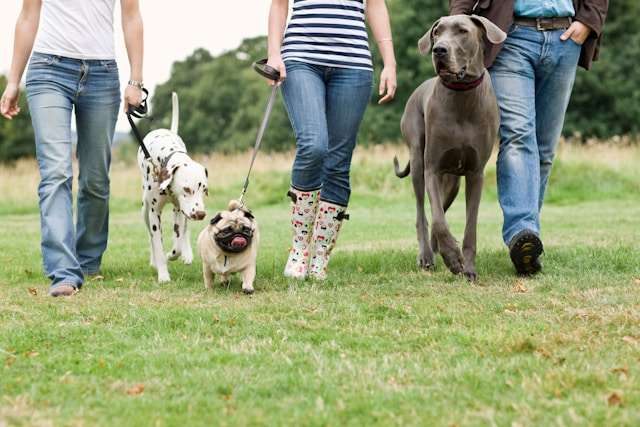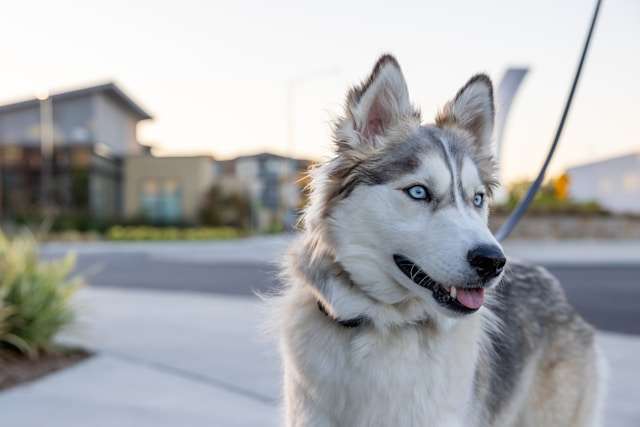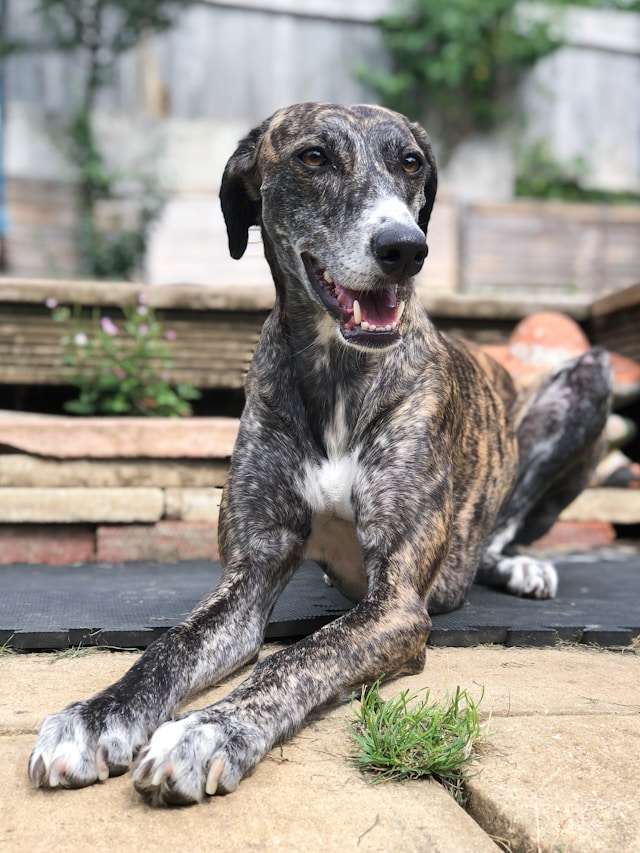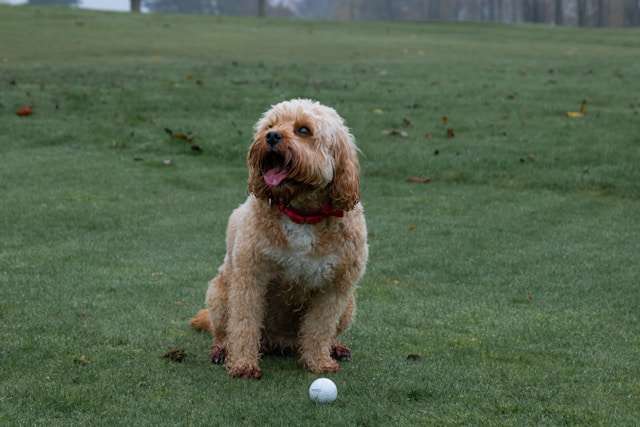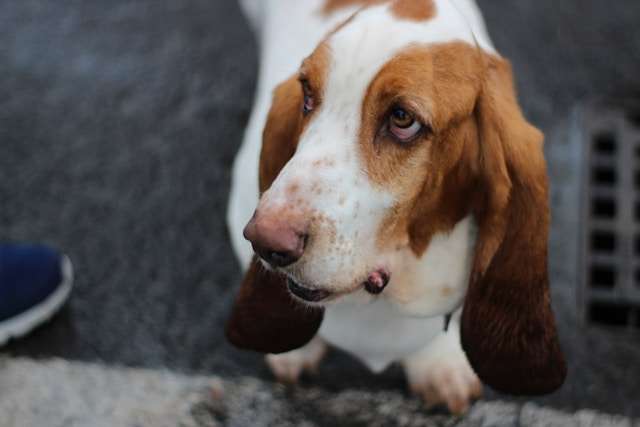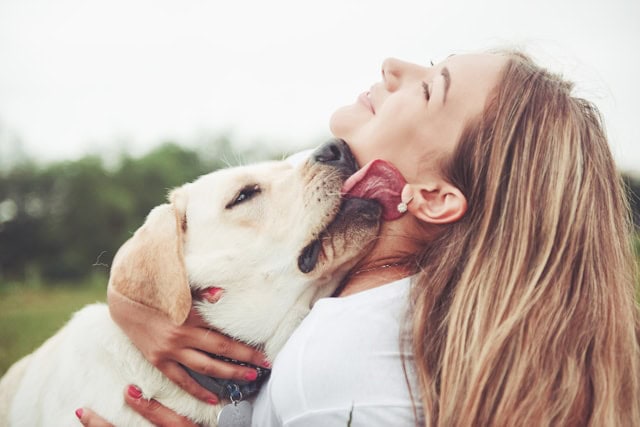Best Hunting Dog Breeds
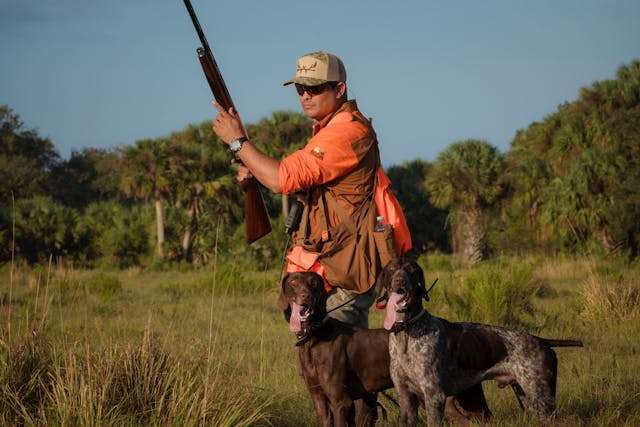
Best Hunting Dog Breeds. Hunting dogs have been loyal partners to humans for centuries. From tracking games to retrieving in water, these breeds have unmatched skills and instincts.
Today, they’re prized for their working abilities and cherished as family companions.
Whether you’re interested in their history, unique traits, or care needs, there’s plenty to learn about these remarkable dogs. Want to know more about hunting-friendly breeds? Explore their characteristics and stories, like Cocker Spaniels’ transition from workers to family pets or how Dachshunds were bred for hunting burrowing animals.
Table of Contents
The History and Evolution of Hunting Dogs
Hunting dogs have been by our side for thousands of years, evolving alongside human needs. From forest trackers to cherished companions, their journey is a story of loyalty and purpose.
Origins of Hunting Dogs
Dogs were domesticated over 15,000 years ago, and some of the earliest breeds were adapted for hunting. Early humans valued dogs for their sharp senses and innate hunting instincts. Over time, selective breeding led to dogs with specialized skill sets. For example:
- Scent hounds like Beagles were bred for exceptional noses to track prey over long distances. Learn more about their fascinating attributes in 10 Fascinating Facts About Beagles You Need.
- Thanks to their soft mouths, retriever breeds like Labradors excelled at bringing back the game without damaging it.
These purposeful traits established hunting dogs as essential allies in survival and resource gathering.
Cultural Significance of Hunting Dogs
In ancient societies, hunting dogs were more than working animals; they symbolized status and skill. For instance:
- Medieval Europe saw nobles using Greyhounds and Spaniels as hunting companions, demonstrating wealth and power.
- Native American tribes relied on dogs to flush out small game, serving as both workers and spiritual symbols.
- In the Middle East, Salukis were revered for their speed and agility, often considered gifts of the gods.
Hunting dogs weren’t just valuable tools—they were cultural icons, deeply woven into daily life and traditions.
Modern Hunting Versatility
Today, hunting dogs wear many hats. While some excel in recreational hunting, others have seamlessly transitioned to family life. Breeds like the Pointer continue being active hunters while thriving in homes as gentle companions.
Modern roles include:
- Search and rescue work.
- Acting as therapy animals.
- Participation in sports like agility and tracking.
The innate traits that once made them great hunters now shine in new, diverse roles. Discover other versatile breeds with a hunting lineage in Dog Breed Guide: Find Your Perfect Companion.

Photo by Tima Miroshnichenko
Popular Hunting Dog Breeds and Their Strengths
Hunting dogs come in many shapes and sizes, each adapted to excel in specific roles. From agile retrievers to determined trackers, these breeds have both history and skills on their side. Let’s explore some of the most popular hunting dogs and what makes them stand out.
Beagles: The Loyal Trackers
Beagles are unmatched when it comes to tracking scents. Their keen sense of smell and relentless nature make them excellent trackers, especially for small game like rabbits and hares. Their compact size allows them to easily navigate dense areas, while their friendly demeanor ensures they work well alongside humans. To further dive into their fascinating abilities and quirks, check out 10 Fascinating Facts About Beagles You Need.
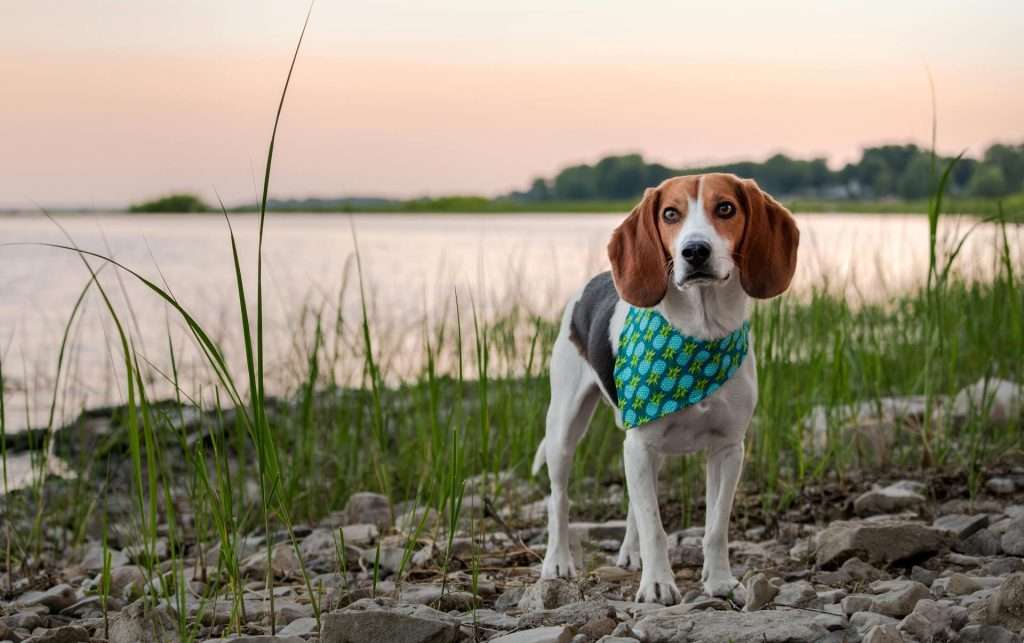
Photo by Kim Dubois
Cocker Spaniels: From Hunting to Household Favorites
Originally bred as hunting companions, Cocker Spaniels excelled in flushing birds from dense brush. Over time, their gentle and sociable nature led to their rise as beloved family pets while retaining their hunting instincts. This versatility and charm make them a unique breed for hunters and families. Learn more about their history and roles in the Cocker Spaniel Dog Breed: Characteristics And Care 2024.
Labrador Retrievers: Masters of Retrieval
Labrador Retrievers are the gold standard for retrieving games on land or in water. Their intelligence, trainability, and strong swimming skills are ideal for waterfowl hunting. Labs are known for their “soft mouths,” allowing them to carry prey without causing damage—a trait highly prized in hunting. Their playful nature also makes them excellent family companions.

Photo by Justin Buisson
German Shorthaired Pointers: All-Terrain Versatility
German Shorthaired Pointers are a dynamic breed known for their ability to adapt to various terrains. Whether you’re hunting in open fields, dense woods, or wet marshlands, their stamina and agility keep them at the top of their game. These dogs are skilled at pointing and retrieving, making them multipurpose hunting companions.

Photo by Brixiv
Terriers: The Bold Hunters
Terriers might be tiny, but they are full of determination and courage. These tenacious dogs were bred to hunt small prey like rats and foxes, often going underground to flush out their quarry.
Their feisty personalities and quick reflexes make them ideal for specific hunting tasks. Learn more about terrier breeds and their unique characteristics at Dog Nutrition Guides – Dog Breeds.
Each of these breeds brings its skills to the table, showcasing the diversity and specialization of hunting dogs. Whether you’re looking for a tracker, a retriever, or an all-around hard worker, there’s a hunting breed that fits the bill perfectly.
Training Hunting Dogs
Training a hunting dog is both an art and a science. These dogs possess instincts, but proper guidance can refine their skills to ensure they’re reliable companions in the field. Here, we break down the essentials of training your hunting dog into three key areas.
Basic Obedience Training
Obedience training isn’t just a starting point – it’s the foundation for all hunting activities. Teaching basic commands like sit, stay, and come ensures your hunting dog responds promptly, even in high-energy situations.
- Sit and stay: These commands are crucial for maintaining control when waiting or observing a game.
- Recall (come): A dog with stellar recall will quickly return to you when called, avoiding distractions like other animals or scents.
- Heel: Keeping your dog close during walks or hunting conditions builds discipline and prevents wandering.
Reinforce commands with positive rewards through treats, praise, or play. Consistent repetition strengthens their understanding. A well-trained dog in obedience translates to a reliable hunting partner you can trust.

Photo by Tima Miroshnichenko
Developing Hunting Skills
Once basic obedience is mastered, it’s time to hone specialized hunting abilities. Training should be tailored to your dog’s breed and intended purpose, whether tracking, retrieving, or pointing.
- Tracking: Utilize scented items to train your dog on the following trails. Gradually increase complexity by adding more distractions.
- Pointing: Encourage your dog to freeze and point upon sensing the game. Reinforce this behavior with clear hand signals and praise.
- Retrieving: Start with small, soft items before progressing to decoys. Reward them for fetching and gently bringing items back to you.
Field training is best done in environments that mimic actual hunting conditions. Consider integrating hunting simulation exercises early to acclimate your dog to sounds, sights, and scents they’ll encounter in the wild.
Socialization and Temperament Adjustments
A hunting dog must strike a balance between drive and discipline. Socialization helps them become adaptable, allowing them to focus in various settings or around other animals. Exposing your dog to different environments during their early months is a game-changer.
Steps to enhance socialization:
- Introduce them to different terrains like grassy fields, wooded areas, or water bodies.
- Familiarize your dog with varied sounds (e.g., gunfire) to prevent fear.
- Arrange playtime with other dogs and exposure to humans to foster good behavior.
A well-socialized dog is confident, responsive, and less likely to become overwhelmed while hunting.
Nutritional Needs for Hunting Dogs
Hunting dogs are more than companions — athletes that require proper nutrition to maintain optimal performance. Their active lifestyle demands special attention to remain healthy, strong, and ready for the chase.
High-Energy Diets
Hunting dogs burn many calories during long days in the field, making a high-energy diet crucial. These diets should prioritize high-protein content to support muscle development and repair, as well as sufficient fats for long-lasting energy.
- Protein matters: Protein is the building block for strong muscles. Look for dog food formulas containing 25% to 30% protein to meet their active needs.
- Healthy fats are essential: Fats provide sustained energy while supporting healthy skin and coats. Opt for foods with 15% to 20% fat content.
- Carbohydrates for quick energy: Carbs are an immediate fuel source during short bursts of activity. Include moderate amounts to balance energy spikes.
Consider feeding your dog premium, high-performance diets during hunting seasons. These are specially formulated to meet the caloric demands of hardworking dogs. Are you interested in more insights? Explore Nutrition Tips | Dog Nutrition Guides for further recommendations.

Photo by Tima Miroshnichenko
Hydration and Recovery
Hydration is a cornerstone of maintaining a hunting dog’s health, especially during long, physically demanding outings. Without enough water, they risk dehydration, leading to fatigue and reduced performance.
- Always carry fresh water: Pack a collapsible bowl and offer water regularly on hunts.
- Electrolytes for recovery: After intense activity, consider electrolyte-enhanced water to replenish lost minerals like sodium and potassium.
- Wet food adds hydration: Incorporating wet dog food into meals can provide essential nutrients and extra fluids.
Post-activity recovery is equally important. Ensure your dog rests adequately, and provide nutrient-dense snacks for quick replenishment. Recovery maintains their health and ensures they’re always ready for the next adventure.
Tailoring a balanced diet with proper hydration ensures your hunting dog thrives during their active pursuits.
Caring for Hunting Dogs
Hunting dogs are exceptional athletes and companions, combining instinct and agility to excel in the field. Proper care enhances their performance and keeps them healthy and happy. Below, we’ll cover grooming, exercise, and health management aspects specific to these hardworking breeds.
Grooming Essentials
Each hunting breed has its unique coat type, requiring tailored grooming to maintain optimal performance. Neglected grooming can lead to hygiene issues, ultimately affecting their hunting efficiency. Here’s a breakdown based on coat types:
- Short-haired breeds (e.g., Pointers): Weekly brushing with a soft brush or grooming mitt helps reduce shedding and keeps their coat sleek.
- Medium coats (e.g., Retrievers): Brush twice weekly to prevent matting, especially after outdoor adventures where debris might collect.
- Long-haired breeds (e.g., Setters): Daily brushing is crucial as their coats are prone to tangling and matting, especially when navigating dense foliage in the wild.
Don’t forget trimming, as overly long nails can interfere with your dog’s mobility on rough terrains. Include cleaning their ears regularly, as hunting dogs are prone to infections due to dirt, water, and debris exposure.
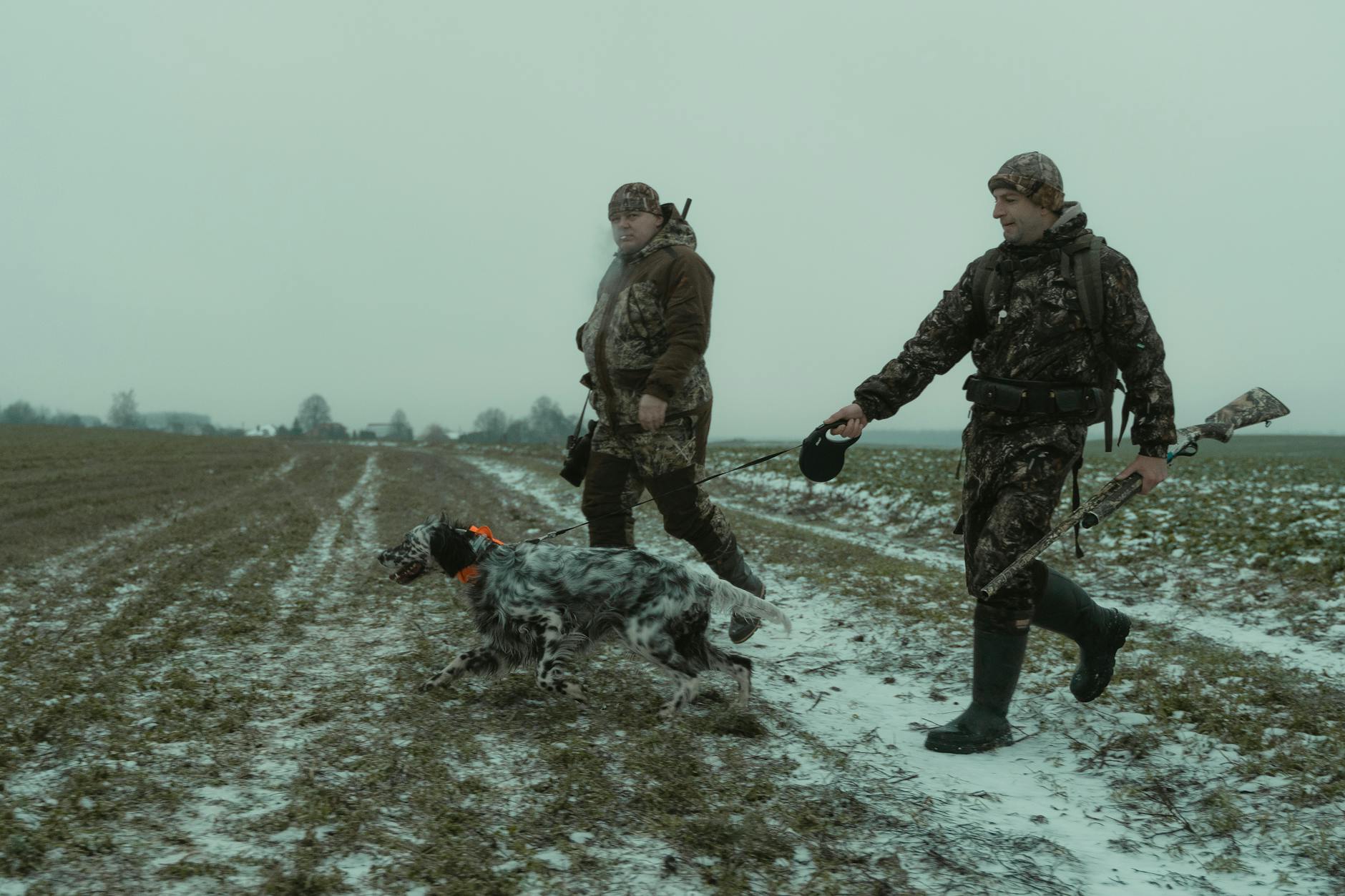
Photo by Tima Miroshnichenko
Physical and Mental Exercise
Hunting breeds are energy powerhouses; they may become restless or destructive without proper outlets for their stamina. Ensure they get both physical and mental engagement daily:
- Daily exercise: Long walks, runs, or swims are great ways to tire them out physically. Aim for at least 60-90 minutes of activity.
- Training games: Hide-and-seek or fetch helps hone their instincts while providing mental stimulation.
- Puzzle toys: Use food-dispensing toys to add a challenging element to their downtime.
- Field practice: Simulate hunting conditions with retrieval drills or scent-tracking tasks to keep their skills sharp even in the off-season.
Routine activity isn’t just for performance—it keeps their muscles toned and their minds sharp and prevents behavioral problems.
Preventing Common Health Issues
Every hunting breed faces unique health risks, but proper care can prevent or manage most issues. Be proactive in addressing these common concerns:
- Joint problems: Hunting dogs often develop joint-related issues like hip or elbow dysplasia. Supplements containing glucosamine and chondroitin can support joint health.
- Ear infections: Regular ear checks and cleaning prevent infections caused by outdoor elements.
- Bloat (Gastric Dilatation Volvulus): Breeds like Retrievers and Setters are prone to this life-threatening condition. Avoid vigorous exercise immediately after meals and feed in smaller, more frequent portions.
- Paw injuries: Frequent checks after outings are essential to catch cuts or debris lodged between pads.
- Obesity: Active dogs require proper portion control to avoid excess weight, which can strain their joints and reduce performance.
Routine vet visits can spot early signs of these issues, ensuring your hunting partner stays in peak condition.
Stay tuned for more practical tips on caring for your hunting companion!
FAQ About Hunting Dog Breeds
When hunting dog breeds, questions about their behavior, training, and care needs often arise. Let’s address some common concerns and curiosities raised by potential and current owners.
What Is a Hunting Dog?
Hunting dogs are breeds specifically developed to assist hunters in locating, tracking, or retrieving game. They possess unique traits such as keen senses, endurance, and trainability, making them indispensable. Breeds like Labrador Retrievers, Beagles, and German Shorthaired Pointers are among the most popular hunting companions.
Are All Hunting Dogs Active?
Yes, hunting dogs are generally highly active. Their energy levels stem from generations of selective breeding to create tireless, agile workers. If you’re considering adopting one, ensure you have the time and space to meet their exercise needs. Learn more about exercise essentials for active breeds in Caring for Active Dogs.
Can Hunting Dogs Be Family Pets?
Absolutely! Many hunting breeds, like Golden Retrievers and Cocker Spaniels, are adaptable and get along well with families. Their intelligence and affectionate nature make them great companions—just be prepared to provide plenty of activity to keep boredom at bay.

Photo by Tima Miroshnichenko
Do Hunting Dogs Smell More Than Other Breeds?
Hunting dogs may develop a more potent “doggy odor” because they spend more time outdoors, often in wet or muddy environments. Regular grooming, including brushing and occasional bathing with appropriate products, helps keep their scent under control.
How Long Do Hunting Dogs Typically Live?
Lifespan varies by breed, but most hunting dogs live anywhere between 10 to 14 years. Proper care, nutrition, and regular vet visits can ensure they enjoy a long, healthy life. You can explore more about their health needs in Dog Breed Guide for Health and Longevity.
Can Hunting Dogs Be Trained for Other Jobs?
Yes, hunting dogs are highly versatile due to their intelligence and work ethic. Many are trained for jobs like search and rescue, therapy work, or even competitive sports such as agility and obedience trials.
This FAQ section should give you a better understanding of these remarkable breeds, their behaviors, and how they can adapt to various lifestyles.
Conclusion
Hunting dogs are more than workers—they’re trusted allies with skills honed over centuries. Their dedication, intelligence, and versatility make them exceptional companions for active families and hunters alike.
Owning a hunting dog means embracing the responsibility of meeting their physical, mental, and emotional needs. Proper training, care, and nutrition ensure they thrive both in the field and at home. Learn more about tailored care in The Ultimate Guide to Labrador Retriever Care and Training.
Whether you want a loyal tracker, retriever, or all-purpose helper, hunting breeds are as rewarding as they are capable. Which hunting breed do you think best fits your lifestyle?

